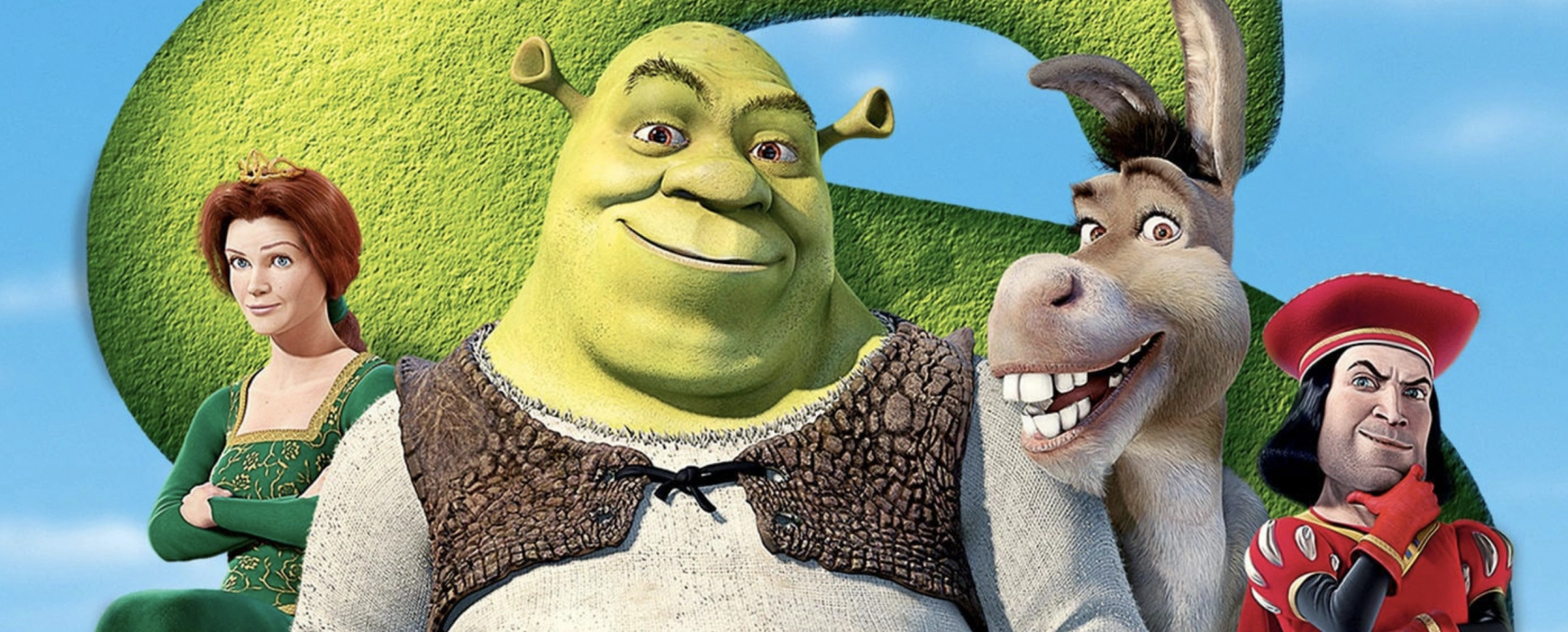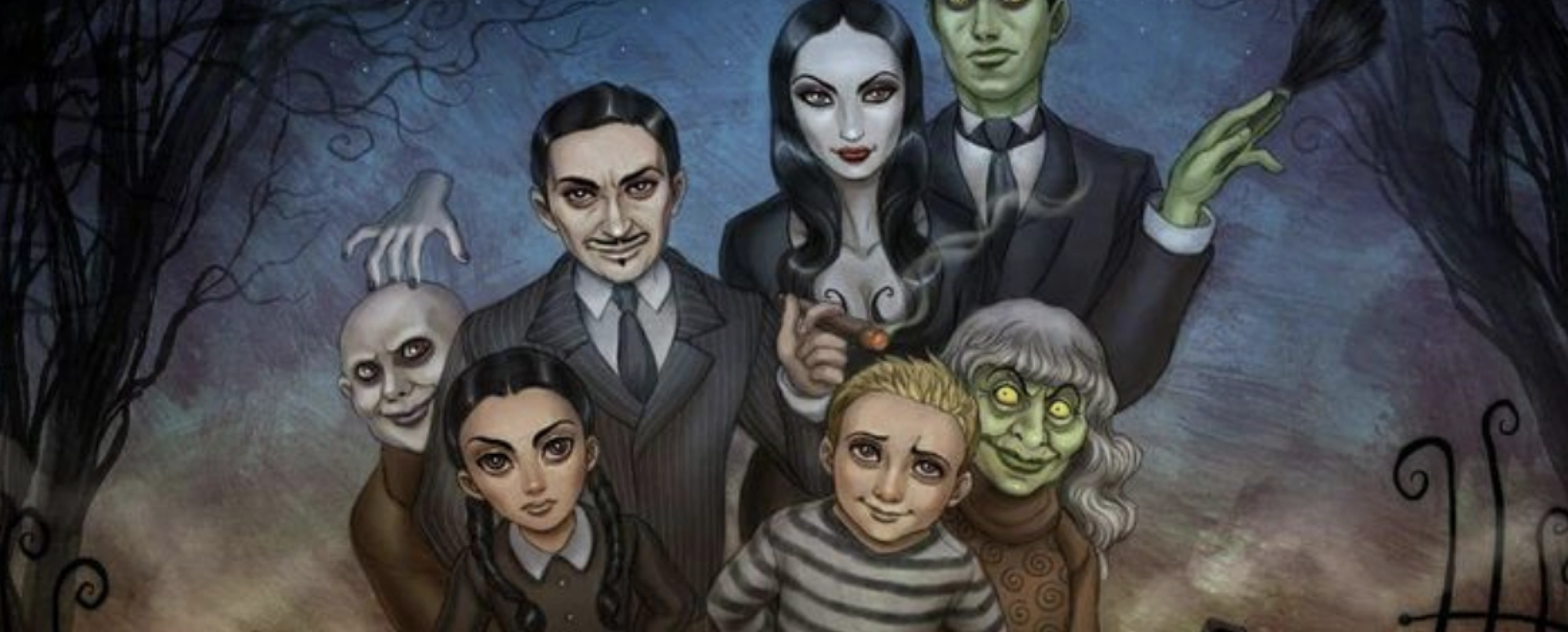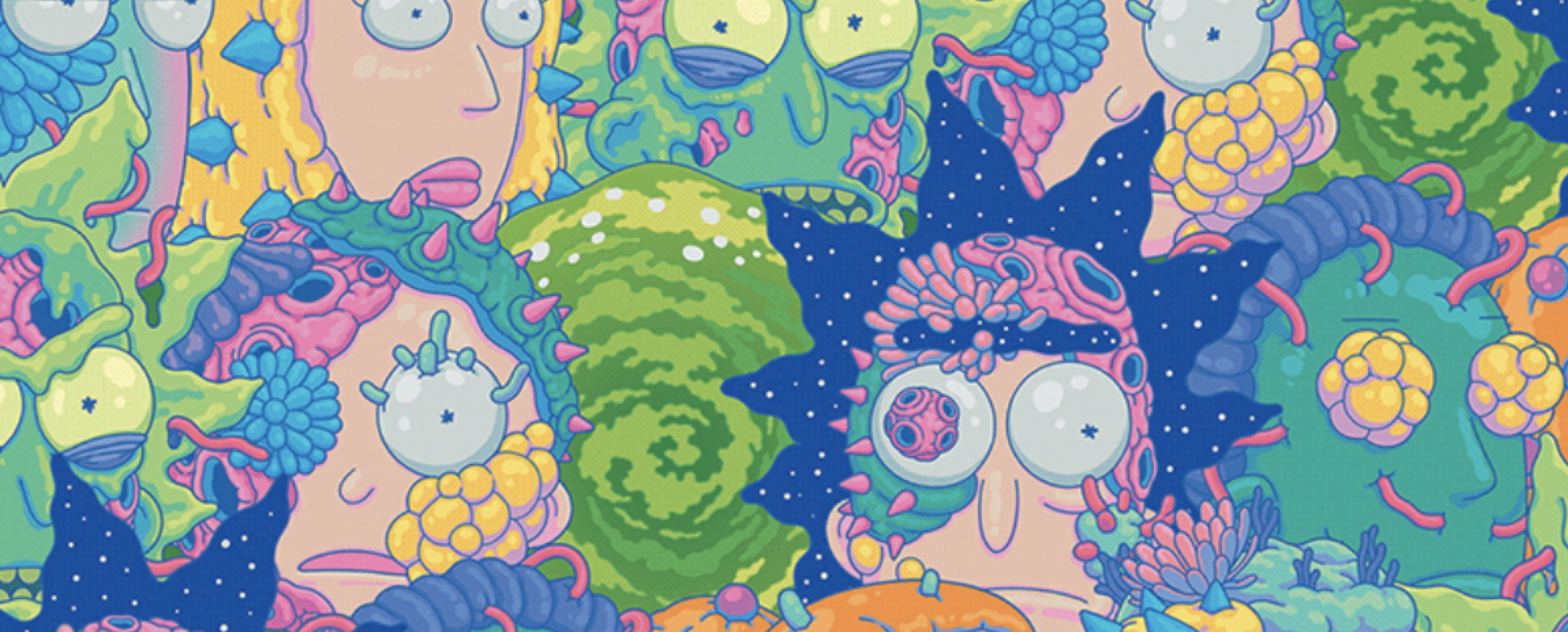Released in 1999, the original Matrix movie is a sci-fi instant classic that shaped generations. It introduced audiences to now commonplace phrases like “take the red pill” and “a glitch in the Matrix,” wowed with filmmaking innovations like bullet time, and served as many people’s first exposure to the concepts of the metaverse and the simulation hypothesis . Yet alongside the technological and philosophical elements of the film, its personal core gave viewers an emotional reason to get invested.
The Matrix went on to spawn two sequels in the original trilogy, another follow-up in 2021, and The Animatrix, a short film collection based on the universe of the movies. We’re focusing on just the original Matrix in this post. It’s the start of everything, plus it’s widely regarded as the best.
We'll examine the main Matrix characters’ personality types using the Enneagram here, highlighting and analyzing the cues we think are most important in identifying their types. The Enneagram types we’ve assigned to Neo, Trinity, Morpheus, and Cypher are our best guesses, given our observation of their motivations, decisions, behaviors, speech, body language, and more. We’ll explain which type we think they are and why, using examples when relevant. We aren’t doing Agent Smith because although he’s certainly a main and memorable character, his personification as an intelligent machine leaves him lacking when it comes to personality depth.
Spoilers for The Matrix ahead (although it’s 23 years old now, so you shouldn’t be surprised by this point). Note that type descriptions below come from Blueprint, our Enneagram app .
What Enneagram type is Neo?
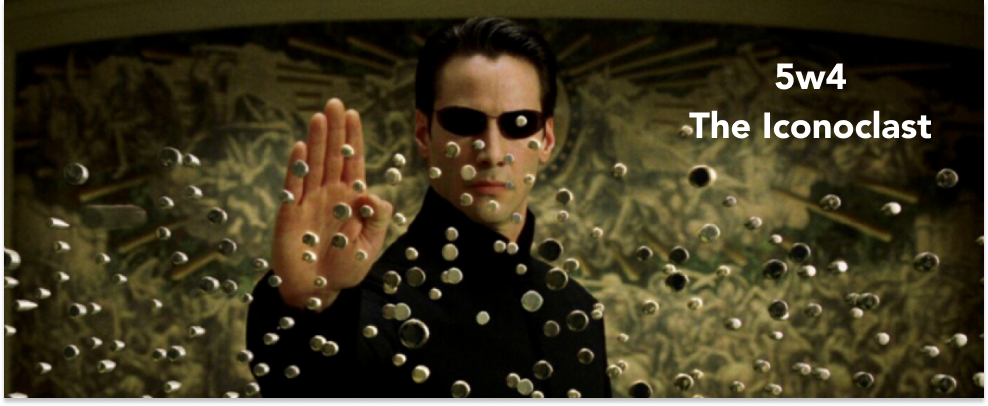
Our best guess for Neo is a Five with a Four wing (the Iconoclast): the Iconoclast is inventive, cerebral, intellectually-intuitive, unassuming, abstract, eccentric, disconnected, subversive, and reclusive. They are contemplative and astute explorers, but can be antagonistic and nihilistic.
Neo’s character arc throughout the film moves from questioner to learner to master. All three roles are common for Enneagram Fives, especially as they gain competence and thus confidence in themselves. Logical, data-oriented, and curious, Fives address their core fear of being incapable by devouring knowledge in their quest for skills and answers. They tend to have a reverence for the truth, regardless of how dark or uncomfortable it could be.
Neo: “I can't go back, can I?”
Morpheus: “No. But if you could, would you really want to?”
A computer programmer by day and hacker by night, Neo focused on acquiring knowledge and understanding complex systems. The matrix, of course, turns out to be the most complex system of all, a simulated reality that enslaves billions of humans in a dreamlike state beyond their awareness. Neo only sees the sparsest evidence of the matrix’s existence while he’s still plugged into it, finding references to it along with the names of high-level hackers like Morpheus and Trinity. He researches to the point of exhaustion, falling into rabbit holes to pursue his obsessive search for the truth.
The tendency to get sucked into bouts of research, particularly to the point where they disrupt one’s sleep schedule, is common for Fives and people who rank highly in Five traits. The initial scene in his apartment references this. Neo is shown sitting at his desk in front of many computer monitors, pondering over not being able to wake up from a dream. His customers show up late to buy a disc he made for them and he appears annoyed that they’re interrupting his research. They invite him out to a club and he declines out of habit, giving the sense that he’s probably disagreeable and not very social. Fives tend to prefer solo activities, getting sucked into their hobbies and knowledge areas rather than socializing. But when he gets an anonymous message to “follow the white rabbit” (likely a reference to both Alice in Wonderland and the research rabbit holes that he’s found himself in), his curiosity leads him to meet Trinity and starts his process of “waking up.”
Because Neo’s character is established as a truth-seeker, we already know that he will take the red pill when Morpheus offers him the choice. He orients himself fairly quickly after the crushing discovery of what “real” reality is: a dystopian hellscape where machines harvest humans as an energy source, and where the remaining humans live on ships or underground in the last city, Zion. The crew of Morpheus’s ship are amazed at how Neo becomes a sponge for knowledge. He absorbs program after program on nearly every style of martial arts without even taking a break, and seeks to test his newfound skills on Morpheus as soon as he can. The direct neural transfer of skill mastery is a Five’s dream come true.
As Neo moves from questioning what the matrix is to mastering his skills within it, he ponders whether he could be The One. Morpheus openly believes in him, Trinity quietly believes in him, but Neo doesn’t believe in himself. He doesn’t feel like he’s the chosen one because he’s not an egocentric type; he’s more withdrawn and needs data and evidence before he can accept it. Even though he knows he’s in the matrix, he still fails the initial test of jumping across the gap between skyscrapers. It’s only through practice and experience inside the matrix that he gains confidence in his abilities; the trials he undergoes when rescuing Morpheus push his abilities to their limits and beyond, where he unlocks the god-like powers of manipulating time and dodging bullets. This development path mirrors how Fives are often the last people to accept their mastery in an area when everyone around them sees them at the top of their craft.
A Five with a Four wing is called the Iconoclast, which means "a person who attacks cherished beliefs or institutions." Neo does this literally: he is perceptive enough to sense a wrongness in his reality, unlike the majority of simulation-dwellers who live out their lives without questioning it. Fives are withdrawn and highly observant people who tend to spot the details and patterns that others miss. In Neo’s case, his dogged pursuit of the truth leads him to learn that the Matrix is enslaving people, and he attacks the AIs that hold them hostage.
Morpheus: “Do you believe in fate, Neo?”
Neo: “No.”
Morpheus: “Why not?”
Neo: “'Cause I don't like the idea that I'm not in control of my life.”
The Four wing makes Fives more philosophical, pondering the big, often seemingly unsolvable questions of life and the universe. It also provides the feeling that something is missing, whether from their identity, the world around them, or both. Whereas Fives with a Six wing (Problem-Solvers) tend to focus on mastering and fixing what’s practical, Fives with a Four Wing often look to innovate in new, less explored areas (like how Neo pioneers a new way of interacting with the Matrix that gives him god-like powers as The One).
Fives tend to over-express their thinking and be out of touch with their feelings. We see this play out with Neo’s lack of awareness that Trinity has feelings for him. Despite the rest of the crew picking up on it, Neo is the last to know. Even the Oracle references it:
Oracle: “You're cuter than I thought. I can see why she likes you.”
Neo: “Who?”
Oracle: “Not too bright, though.”
What Enneagram type is Cypher?
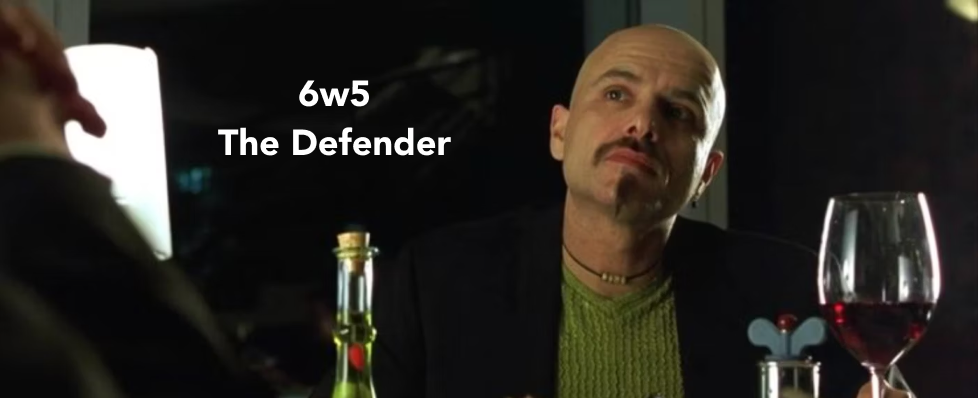
Our best guess for Cypher is a low-health Six with a Five wing (the Defender): the Defender is trustworthy, understanding, analytical, committed, vigilant, political, cynical, pessimistic, and anxious. They are intellectual thinkers who champion the underdog, but can be overzealous and conniving.
Alongside the Agents, Cypher is the villain of the film. His primary role is as a backstabber who betrays the crew to set himself up for a comfortable, if not real, life inside the Matrix. While Neo is driven to seek the truth at all costs, Cypher is his opposite: having seen the truth and how stark it is, he prefers the “safety” of the matrix. In an early scene with both Neo and Cypher, Cypher misreads Neo’s character and projects his own feelings on him:
Cypher: “I know what you're thinking, 'cause right now I'm thinking the same thing. Actually, I've been thinking it ever since I got here: Why oh why didn't I take the BLUE pill?”
Sixes fear that they lack support or guidance, and they crave security. To insecure Sixes, “the devil you know is better than the devil you don’t:” they’d rather stick with something that’s flawed but familiar than face the unknown. Cypher grew up in the matrix, he understands it, and he bargains with the Agents to re-enter the simulation with lots of resources and no memory of what happened. He values a comfortable, safe unreality over an uncomfortable, dangerous reality.
Cypher: “You know, I know this steak doesn't exist. I know that when I put it in my mouth, the Matrix is telling my brain that it is juicy and delicious. After nine years, you know what I realize?”
[Takes a bite of steak]
Cypher: “Ignorance is bliss.”
Sixes have a mixed relationship with authority, sometimes following it reverently, and other times undermining it. Their conflict style tends to be indirect and behind the scenes, preferring to act in the shadows through conspiracy and subterfuge. They think of themselves as masterminds who can see around corners and surprise their foes. Thus it fits the profile of the Six that Cypher wouldn’t confront Morpheus directly with his grievances, but would strategize his betrayal without anyone knowing:
Cypher: “I'm tired, Trinity. I'm tired of this world. I'm tired of fighting, tired of this ship, being cold and eating the same goddamn groop every day. But most of all, I'm tired of that jag-off and all of his bullshit.”
Cypher: [to Morpheus] “Surprise, asshole! I bet you never saw this coming, did you? God, I wish I could be there when they break you. I wish I could walk in just when it happens. So that right then, you'd know it was me.”
Trinity: “You gave them Morpheus.”
Cypher: “He lied to us, Trinity. He tricked us! If you had told us the truth, we'd have told you to shove that red pill right up your ass!”
Trinity: “That's not true, Cypher, he set us free.”
Cypher: [looking up inside the Nebuchadnezzar] “Free. You call *this* free? All I do is what he tells me to do. If I have to choose between that and the Matrix, I choose the Matrix!”
It’s telling in the above dialogue that Cypher accuses Morpheus of “lying” to the crew by waking them up to their dystopian reality. Of course, Morpheus didn’t lie: he offered every member the choice of the red or blue pill, and Cypher chose the red pill or he wouldn’t be where he is. Yet to Cypher, this reality is a “lie” because he doesn’t like the outcome. Low-health Sixes tend to have a flexible relationship with the truth where they bend facts in self-serving ways and cannot see their own role in any blame-worthy behavior. Cypher doesn’t enjoy the truth, so he labels it a lie.
What Enneagram type is Trinity?
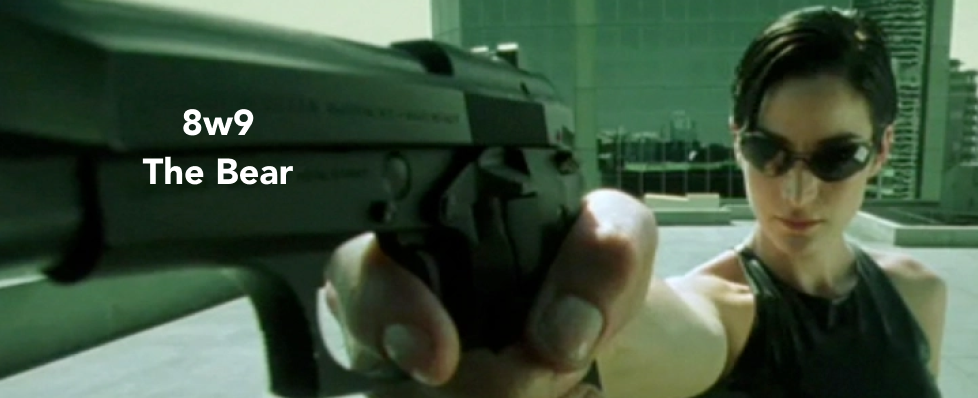
Our best guess for Trinity is an Eight with a Nine wing (the Bear): the Bear is protective, quietly strong, resolute, shrewd, watchful, territorial, objectifying, coarse, and provoking. They are attuned to others and secretly tender-hearted, but can be selfish and menacing.
Trinity’s primary role in the Matrix is as a fighter. She has a strong ability to love, although that trait isn’t revealed until the end of the film. As with most Eights, she leads with toughness and action and guards the soft inner core of her heart, sharing it only with those she reluctantly trusts.
The intimidating, “keep your distance” vibe that Trinity projects aligns with the Eight with a Nine wing (the Bear). While Eights with a Seven wing (Mavericks) tend to be more outspoken and aggressive, Bears are colder and more self-controlled. They often project strength and sometimes even scariness to keep threats at bay, as Trinity does with her signature black latex outfits, shades, and attitude.
Eights don’t like being told what to do, or what they can’t do. When Neo is preparing to enter the matrix on an extremely risky mission to save Morpheus, he tells Trinity that he needs to act alone. She won’t take “no” for an answer:
Neo: “What are you doing?”
Trinity: “I'm going with you.”
Neo: “No you're not.”
Trinity: “No? Let me tell you what I believe. I believe that Morpheus means more to me than he does to you. I believe if you are really serious about rescuing him, you are going to need my help. And since I am the ranking officer on this ship, if you don't like it... I believe you can go to hell. Because you're not going anywhere else. Tank, load us up.”
It’s her stubborn refusal to accept her circumstances, in fact, that saves Neo in the end of the movie. Eights are the unstoppable force in the Enneagram, pushing for what they want until they get it or they collapse trying. Neo is dying in the matrix when Trinity leans over his body on the ship and tells him that this can’t be the end because she loves him, and the Oracle said that whoever she loved would be The One. If there’s any type that can warp reality with the strength of their beliefs, it’s Eights. Also Trinity saying “I’m not afraid anymore” likely refers to her fear of expressing her deep feelings for Neo, as Eights often struggle to open up:
Trinity: “Neo, I'm not afraid anymore. The Oracle told me that I would fall in love and that that man... the man that I loved would be The One. So you see, you can't be dead. You can't be... because I love you. You hear me? I love you.”
[Trinity kisses Neo; Neo's vital signs return]
Trinity: “Now get up!”
Trinity presents a mix of masculinity and femininity that made her character iconic. Although anyone of any gender identity can be any Enneagram type, some Enneagram research has suggested that two of the types show some correlation with gender: Eights correspond to traditionally masculine energy and traits (like aggression, dominance, and a focus on being strong), whereas Twos correspond to traditionally feminine energy and traits (like caretaking, relationship-building, and empathy). The topic of Trinity’s semi androgynous persona comes up in the first conversation that she has with Neo in the club:
Trinity: “My name's Trinity.”
Neo: “*The* Trinity? Who cracked the IRS d-base?”
Trinity: “That was a long time ago.”
Neo: “Jesus…”
Trinity: “What?”
Neo: “I just thought... you were a guy.”
Trinity: “Most guys do.”
What Enneagram type is Morpheus?
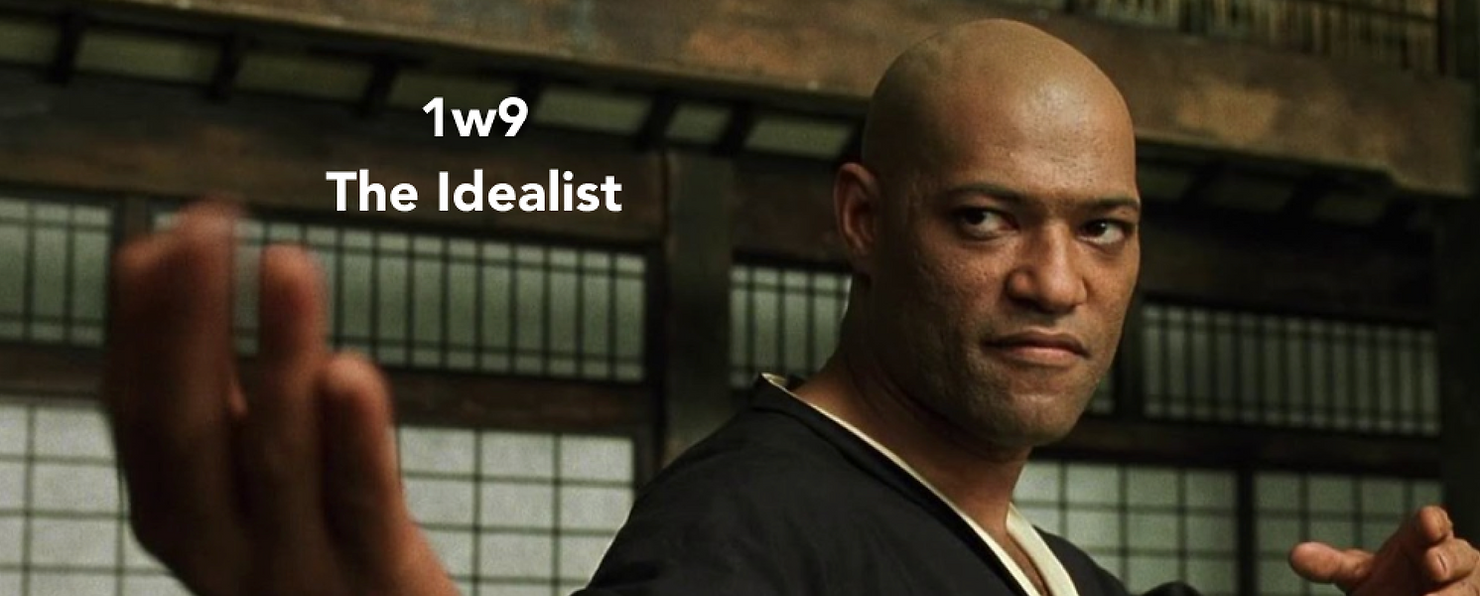
Our best guess for Morpheus is a One with a Nine wing (the Idealist): the Idealist is wise, fair, scholarly, objective, orderly, emotionally reserved, correcting, elitist, and condescending. They are considerate and articulate philosophical idealists, but can be unreasonable and misanthropic.
Morpheus serves as the leader and teacher of the film. Ones often occupy the role of educator, which is a natural fit for a type that focuses on improving oneself and others. Morpheus literally and figuratively wakes people up from their ignorance (and his name is a reference to the Greek god of sleep and dreams ). But he only does so after putting the choice in their hands, because he wants them to be autonomous to make their own decisions. He understands the value of experience: there’s more to knowledge than facts. Sometimes a person has to live a concept to understand it.
Morpheus: “Neo, sooner or later you're going to realize just as I did that there's a difference between knowing the path and walking the path.”
Ones are concerned with doing the “right” thing and seek to live their lives with integrity. Morality is often important to them. In Morpheus’s case, he was awoken by a predecessor who tasked him with continuing the mission of freeing more members of the human race. He also believes in the Oracle’s foretelling of the arrival of The One. He’s depicted as believing deeply in this “religion” of the Matrix:
Morpheus: “This is your last chance. After this, there is no turning back. You take the blue pill—the story ends, you wake up in your bed and believe whatever you want to believe. You take the red pill—you stay in Wonderland and I show you how deep the rabbit hole goes.”
Morpheus: [to Neo who is choosing the red pill] “Remember... all I'm offering is the truth. Nothing more.”
It’s clear that Morpheus takes these related callings seriously. When Cypher betrays the crew and their escape seems impossible, Morpheus sacrifices himself to the agents so that everyone else can get away (and particularly Neo, who he has faith is The One). Even when he’s tortured beyond normal human limits, he refuses to crack and give up the access codes to Zion. He’s willing to surrender himself so that humanity can survive; what is good and right must prevail.
Morpheus’s demeanor and composure suggests that he’s a One with a Nine wing (the Idealist). Idealists have a cool, reserved disposition; they are scholarly, and you rarely see them sweat. Yet as Instinct types, Ones can get angry. They tend to repress their anger until they can’t contain it, as we see in the scene where Morpheus summons all his remaining energy and emotion to scream, break free from his handcuffs, and jump from the room where the agents are torturing him.
Morpheus, Trinity, and Neo are all people who prioritize truth and justice over comfort or agreeability. These types (One, Eight, and Five) make an unstoppable team when pursuing these values.

